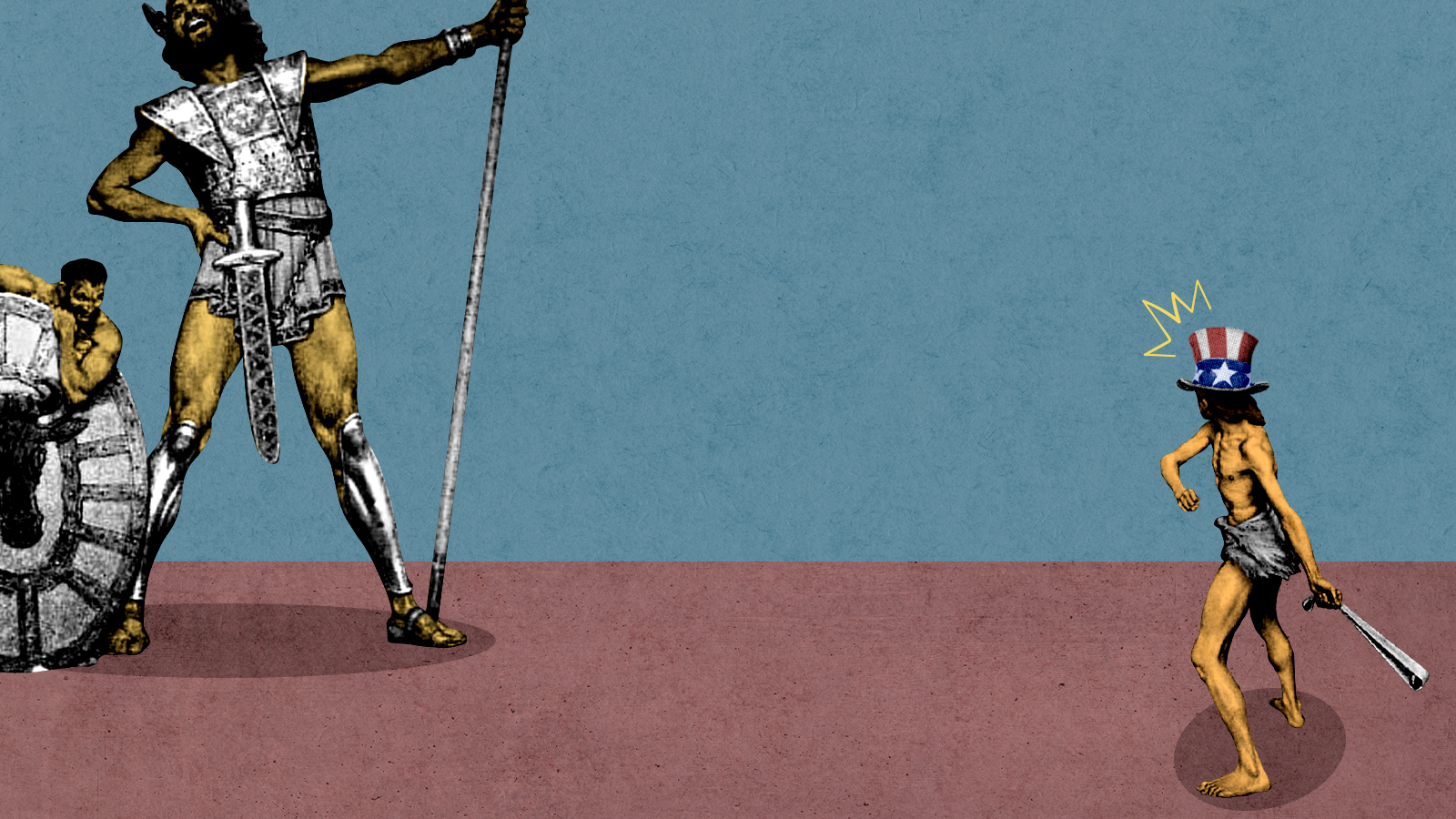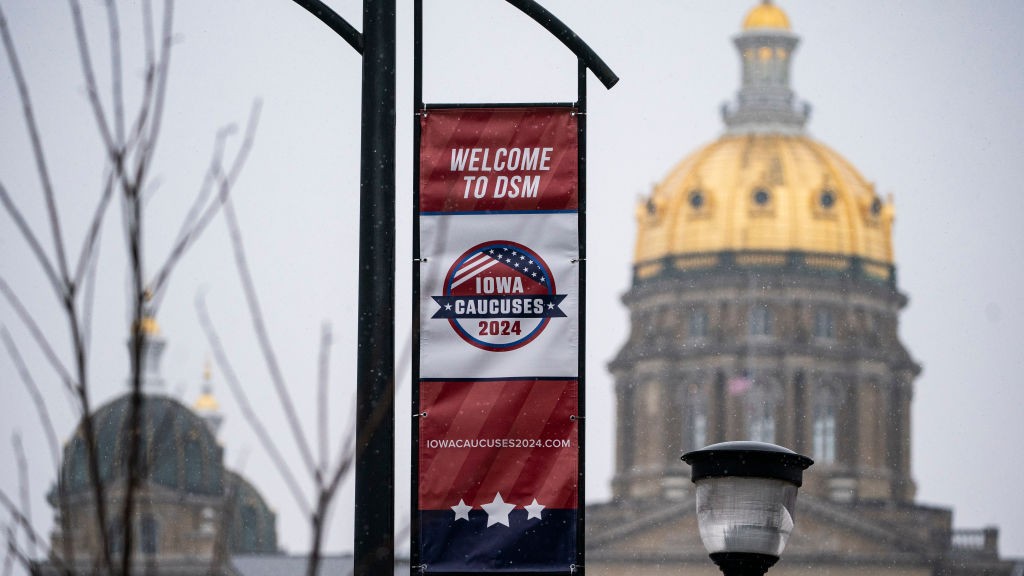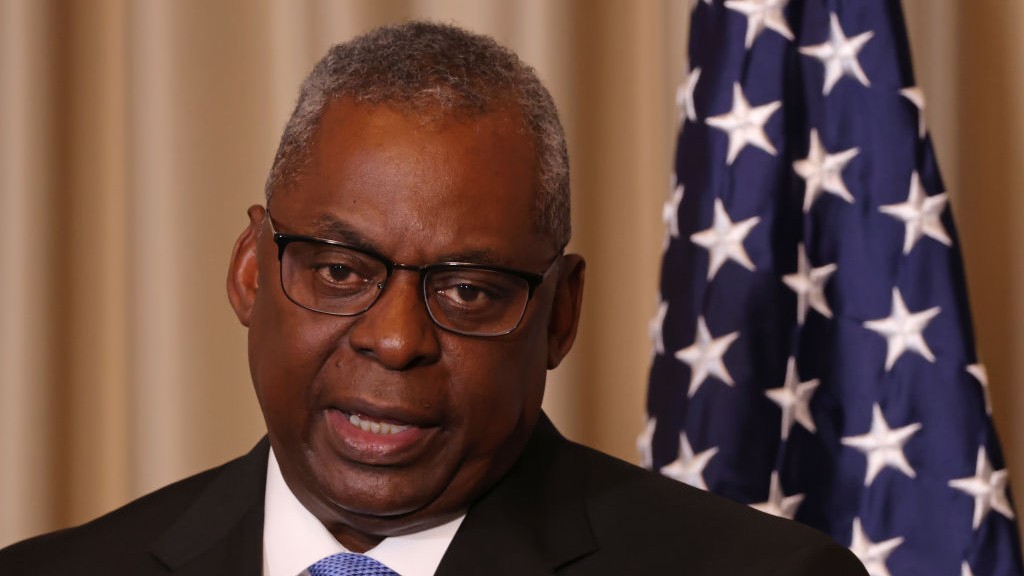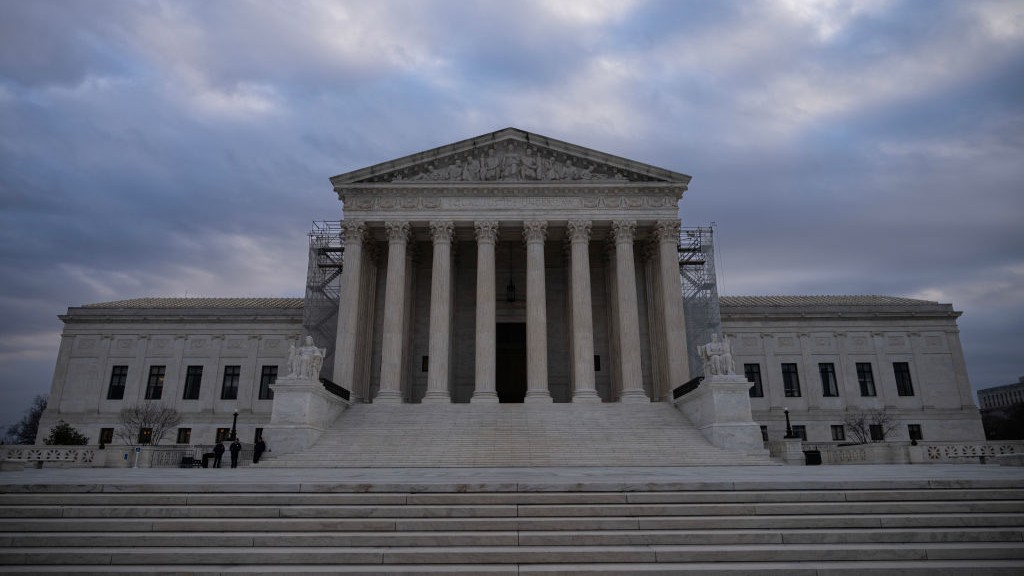America is a nation in search of a foil
The U.S. thinks of itself as a David. But what happens when we're actually the Goliath?


A free daily email with the biggest news stories of the day – and the best features from TheWeek.com
You are now subscribed
Your newsletter sign-up was successful
America has long fancied itself to be a David — the plucky underdog that triumphs against all odds. But a David needs a Goliath, or the story doesn't work. And so America has looked for Goliaths to define itself against.
The Puritans saw themselves as a chosen people in a covenant with God — the same God who had demanded of the Israelites that they not be like other nations. They could only be "a city on the hill," an example to all those other nations, if they managed to succeed in not being like them. The idea of America as a new Israel would persist past the 17th century. Benjamin Franklin wanted the Great Seal of the United States to depict the Red Sea closing on Pharaoh and his chariots. There, of course, the Pharaoh represented the tyranny of the British. From the beginning of the new nation, American identity was wrapped up in opposing tyrants.
Later, in the era of mass European immigration in the late 19th century, America defined itself largely against Europe. "The New Colossus," the poem that greets immigrants from where it's engraved on the Statue of Liberty's pedestal, illustrates this attitude well. Hardly anything in it is about freedom, aside from the closing image of the golden door. Instead, it dwells on the contrast between the "storied pomp" of Europe's "ancient lands" and the sorry state of the inhabitants who are leaving it behind.
The Week
Escape your echo chamber. Get the facts behind the news, plus analysis from multiple perspectives.

Sign up for The Week's Free Newsletters
From our morning news briefing to a weekly Good News Newsletter, get the best of The Week delivered directly to your inbox.
From our morning news briefing to a weekly Good News Newsletter, get the best of The Week delivered directly to your inbox.
A similar dichotomy made an appearance during World War II and the Cold War. The idea of American identity primarily being about commitment to various ideas — liberalism, democracy, capitalism — emerges here because first America's enemies in World War II, and then the Soviet Union, defined themselves against them. Nikita Khrushchev claimed that "we will bury you," and many people thought he was right. Whittaker Chambers, a Soviet spy who eventually left the Soviet underground and became a fervent anti-communist, thought he was joining the losing side by doing so.
But now the Soviet Union is gone. Europe is almost entirely part of the American orbit. Nearly no one believes anymore that America is in some sort of covenant with God that sets it apart from every other nation. The United States is now the most powerful country in the world. In other words, it's Goliath.
It's harder to create a positive vision of what you stand for than it is to simply point elsewhere and say you're against that. As A. E. Housman, the classicist and poet, once observed, poets never write poems about liberty; instead, "they substitute images … and in the last resort, they fall back on denunciation of tyranny, an abominable institution, no doubt, but at any rate less featureless than Liberty, and a godsend to people who have to pretend to write about her."
It's also much easier to unify people when you have an opposing force you can rally against. Past American self-conceptions have always relied on the U.S. being a new idea, an experiment, an underdog. They break down when America is the global hegemon and when American culture and ways of thinking saturate almost everywhere.
A free daily email with the biggest news stories of the day – and the best features from TheWeek.com
The years since the fall of the Soviet Union have seen a lot of casting around for a new worthy adversary. Islamic terrorism, Saddam Hussein, North Korea, Iran, and Russia, among others, have all gotten their turn. None of it has worked, though, since the average American knows that the two sides here are not equal, or anything close to it.
Will China provide a solution to this identity crisis, as it were? I doubt it. The attempts to re-use the anti-Soviet playbook have the flavor of a cargo cult. Repeating the old lines won't make them true. The Chinese don't have an ideology that opposes what Americans hold dear — many Americans can't even describe what their ideology is. (It's definitely not Maoism, even if they say so.)
Certainly, the Chinese don't talk like the Soviets did about how the triumph of communism is inevitable, and America trades far more with China than it ever did with the Soviet Union. Even its cultural relationship with Beijing is different. China has been seen as a market to tap into for so long by established institutions of American culture — the NBA and Hollywood, to name just two — that pivoting to seeing them as the unequivocal enemy would take time.
But if America can't or won't define itself against China, there aren't any other options. Yet a Goliath can't act like a David. The Iranians can refer to America as the Great Satan, but imagining it the other way around is laughable. It's always amusing when athletes and teams talk about how "nobody believed in us" despite being favored to win. An individual athlete or a team can believe such a self-delusion, sure. But not a country of 330 million.
John Quincy Adams once warned a younger America not to go abroad "in search of monsters to destroy." But America has always used monsters abroad to create its sense of self-identity and availed itself of the tricks Housman mentioned. Now it has to define itself without them.
Steve Larkin is a writer from the state of Maine. His writing has appeared in The Week, the Catholic Herald, and other publications.
-
 Local elections 2026: where are they and who is expected to win?
Local elections 2026: where are they and who is expected to win?The Explainer Labour is braced for heavy losses and U-turn on postponing some council elections hasn’t helped the party’s prospects
-
 6 of the world’s most accessible destinations
6 of the world’s most accessible destinationsThe Week Recommends Experience all of Berlin, Singapore and Sydney
-
 How the FCC’s ‘equal time’ rule works
How the FCC’s ‘equal time’ rule worksIn the Spotlight The law is at the heart of the Colbert-CBS conflict
-
 10 things you need to know today: January 21, 2024
10 things you need to know today: January 21, 2024Daily Briefing Palestinian death toll reportedly passes 25,000, top Biden adviser to travel to Egypt and Qatar for hostage talks, and more
-
 10 things you need to know today: January 20, 2024
10 things you need to know today: January 20, 2024Daily Briefing Grand jury reportedly convened to investigate Uvalde shooting response, families protest outside Netanyahu's house as pressure mounts for hostage deal, and more
-
 10 things you need to know today: January 15, 2024
10 things you need to know today: January 15, 2024Daily Briefing Freezing Iowa caucuses to mark first voting of 2024 election, subzero temperatures place stranglehold on much of US, and more
-
 10 things you need to know today: January 14, 2024
10 things you need to know today: January 14, 2024Daily Briefing Israel and Hamas mark 100th day of war, GOP candidates campaign on final day before Iowa caucuses, and more
-
 10 things you need to know today: January 13, 2024
10 things you need to know today: January 13, 2024Daily Briefing Winter storm blankets large swath of northern United States, more than 30 Palestinians killed during overnight airstrike in Gaza, and more
-
 10 things you need to know today: January 7, 2024
10 things you need to know today: January 7, 2024Daily Briefing White House reportedly left unaware of defense secretary’s hospitalization, Biden to deliver State of the Union address on March 7, and more
-
 10 things you need to know today: January 6, 2024
10 things you need to know today: January 6, 2024Daily Briefing Supreme Court to rule on Trump being kept off 2024 presidential ballots, Hezbollah fires rockets toward Israel following Hamas leader’s death, and more
-
 10 things you need to know today: December 17, 2023
10 things you need to know today: December 17, 2023Daily Briefing Putin rejects Biden's claim that Russia will attack NATO, Israel ramps up bombardments of Gaza overnight, and more
